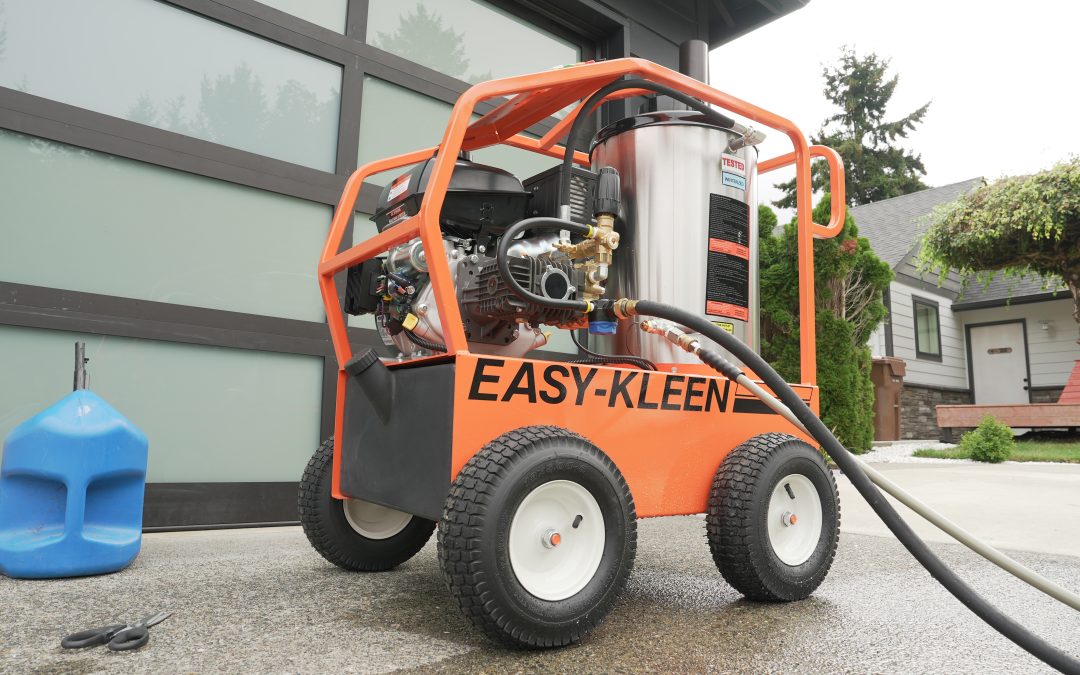
If you’re serious about power washing — whether it’s for launching a business, scaling up operations, or just tackling larger jobs efficiently — investing in a commercial-grade pressure washer is a game-changer. 💪💦
But with so many options on the market, choosing the right machine can feel overwhelming. Between specs like PSI, GPM, pump types, engine brands, and hot vs. cold water systems, it’s easy to get lost in the details.
Don’t worry — we’ve got you covered. This guide walks you through the must-know features, key questions to ask, and insider tips so you can buy the right commercial-grade washer for your goals and budget. 💼🧠
💡 Why Go Commercial?
A commercial-grade pressure washer isn’t just a bigger version of the one you use at home. It’s designed for:
- Longer run times
- Tougher cleaning challenges
- Durability under frequent use
- Higher water pressure and flow
If you’re doing more than just the occasional driveway or patio, a commercial washer will pay for itself in efficiency, reliability, and customer satisfaction. 🧽🚚
🔍 Key Specs That Matter
1. PSI (Pounds per Square Inch)
This measures the pressure output. Most residential washers range from 1,300–2,000 PSI, while commercial units typically offer:
- 3,000–4,000 PSI (cold water)
- Up to 5,000+ PSI (heavy-duty, hot water units)
🎯 More PSI means deeper cleaning power — but remember, pressure alone isn’t everything.
2. GPM (Gallons per Minute)
This measures the water volume delivered per minute.
- Higher GPM = faster cleaning
- Look for 3.0–5.0 GPM for commercial use
Think of PSI as the “scrubbing” power and GPM as how quickly you’re rinsing and flushing away debris. When shopping, combine PSI × GPM = cleaning units (CU) — a good benchmark of total performance. 📈
3. Engine Brand and Type
Gas-powered engines dominate the commercial market. Stick with trusted engine manufacturers, such as:
- Honda (GX series): Known for durability and performance
- Kohler: Reliable and easy to service
- Vanguard by Briggs & Stratton: High-end, heavy-duty options
💡 Pro Tip: Avoid off-brand engines if you want long-term reliability or easy access to parts and service.
4. Pump Type
There are three main pump styles:
- Wobble pumps (cheap, entry-level — not for commercial use)
- Axial cam pumps (better, but still mid-grade)
- ✅ Triplex plunger pumps (professional-grade and built to last)
Triplex pumps are highly efficient, repairable, and designed for heavy use — a must for daily or business-related power washing. 🧼🔧
5. Frame and Build Quality
A powerful engine is nothing without a strong frame to support it. Look for:
- Steel or aluminum construction
- Welded frames (not bolted, which can loosen over time)
- Anti-vibration mounts
- Pneumatic tires for easy mobility
You’ll be moving this machine a lot — especially over rough terrain. Solid build quality pays off in convenience and lifespan. 🛞
Browse Amazon Here For Commercial Pressure Washers And Accessories
🔥 Hot Water vs. Cold Water
Ask yourself: what will you clean most often?
- Cold water units are great for blasting away dirt, mud, mildew, and algae
- Hot water washers are essential for greasy, oily, or commercial messes
Hot water washers cost more ($2,500+), but they clean faster and more effectively when oil and grease are involved — especially in auto shops, food service, or fleet cleaning. 🔥🛢️
🧼 Portability and Mounting Options
Depending on your setup, you might need:
- Wheel-mounted units for flexible use on various job sites
- Skid-mounted washers for trailer setups
- Truck-mountable units for full-time contractors
⛓️ If you’re scaling a business, think long-term: Will you be mobile? Stationary? Multi-crew?
🛒 Top Features to Look For
Here’s a checklist of extras that make a real difference:
- ✅ Quick-connect fittings for hoses and accessories
- ✅ Adjustable pressure settings
- ✅ Bypass unloader valve (extends pump life)
- ✅ Hour meter for tracking use and maintenance
- ✅ Detergent tanks or siphon tubes
- ✅ Thermal relief valves (prevent overheating)
Each of these features contributes to better performance, safety, and ease of use.
🔧 Maintenance and Serviceability
If you’re using your pressure washer regularly, you’ll need one that’s easy to maintain.
- Choose models with readily available replacement parts
- Go with brands that have strong dealer networks
- Make sure pumps and engines are serviceable by a local shop
And don’t forget to winterize gas-powered washers if you live in a cold climate! ❄️🧊
💰 Budgeting and Cost Expectations
Expect to spend:
- $900–$2,500 for entry-level commercial cold water units
- $2,500–$6,000+ for hot water machines or trailer systems
💡 Pro Tip: Don’t skimp — a low-quality machine will cost you more in downtime, repairs, and missed jobs.
🧠 Final Buying Questions to Ask
Before you pull the trigger, ask yourself:
- What kind of surfaces will I clean?
- How often will I use the machine?
- Do I need hot water or is cold water enough?
- Will I transport it often or keep it in one location?
- Can I easily get parts and service nearby?
🎯 Final Thoughts
A commercial-grade pressure washer is an investment — not just in equipment, but in your productivity, efficiency, and the image of your business. When chosen wisely, it becomes the backbone of your operation, helping you tackle more jobs, impress more clients, and earn more money. 💵💦
Take your time, do your homework, and buy once, cry never. The right machine can last for years and pay itself off many times over.
Browse Amazon Here For Commercial Pressure Washers And Accessories



